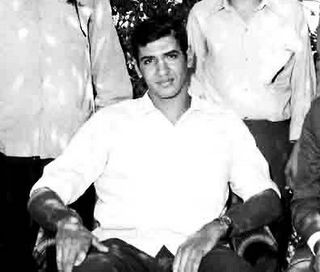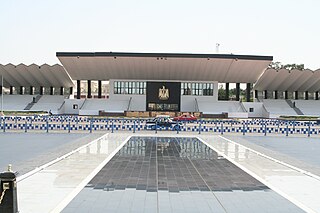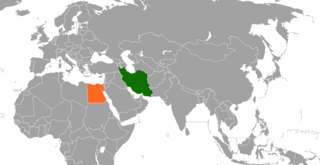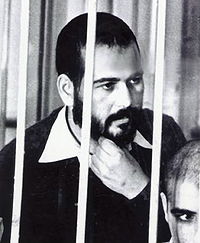
Muhammad Anwar es-Sadat was an Egyptian politician and military officer who served as the third president of Egypt, from 15 October 1970 until his assassination by fundamentalist army officers on 6 October 1981. Sadat was a senior member of the Free Officers who overthrew King Farouk I in the Egyptian Revolution of 1952, and a close confidant of President Gamal Abdel Nasser, under whom he served as vice president twice and whom he succeeded as president in 1970. In 1978, Sadat and Menachem Begin, Prime Minister of Israel, signed a peace treaty in cooperation with United States President Jimmy Carter, for which they were recognized with the Nobel Peace Prize.

Ayman Mohammed Rabie al-Zawahiri was an Egyptian-born pan-Islamist militant and physician who served as the second general emir of al-Qaeda from June 2011 until his death in July 2022. He is best known for being one of the main orchestrators of the September 11 attacks.

Al-Jamāʻah al-islāmīyah is an Egyptian Sunni Islamist movement, and is considered a terrorist organization by the United Kingdom and the European Union, but was removed from the United States list of Foreign Terrorist Organizations in May 2022. The group was dedicated to the overthrow of the Egyptian government and replacing it with an Islamic state. Following the coup that toppled Mohamed Morsi, the group has committed to peaceful activities.

Mohamed Hassanein Heikal was an Egyptian journalist. For 17 years (1957–1974), he was editor-in-chief of the Cairo newspaper Al-Ahram and was a commentator on Arab affairs for more than 50 years.

The Egyptian Military College is the oldest and most prominent military academy in Egypt. One of the colleges of the Egyptian Military Academy Traditionally, graduates of the Military Academy are commissioned as officers in the Egyptian Army. However, they may serve in other branches and commands of the Egyptian military establishment.

Talaat Sadat was an Egyptian politician, lawyer and former political prisoner. He was the nephew of former Egyptian President Anwar Sadat and the brother of Mohamed Anwar Esmat Sadat.
Mohammad Hasan Khalil al-Hakim alias Abu Jihad al-Masri was an Radical Islamist intellectual. US authorities purported al-Hakim to operate in Iran as the head of media and propaganda for al-Qaeda, and "may also [have been] the Chief of External Operations for al Qaeda". The name Abu Jihad is an informal or assumed name meaning roughly "father of the struggle", and al-Masri simply means the Egyptian. He was killed in a US airstrike in Pakistan on October 31, 2008.
Mustafa Hamza is an Egyptian commander of the military branch of the al-Jama'a al-Islamiyya. He was sentenced to death in absentia by an Egyptian court in the Returnees from Afghanistan case. It is believed he took part in the 1981 assassination of Egyptian President Anwar El Sadat, the attempted assassination of President Hosni Mubarak in Addis Ababa in June 1995. He was in Iran until May 2004, when he was extradited to Egypt. He was pardoned in 2012. In November 2017, Swiss TV reported that Mustafa Hamza is being held in Tora Prison and has been in detention for three years. His advocate, Adel Moawad, reportedly expected Hamza to be released in 2018 due to lack of evidence.
Tal'at Fu'ad Qasim, also known as Abu Talal al-Qasimi, was the leader of Egypt's militant al-Jama'a al-Islamiyya organization until he obtained political asylum in Denmark. He was executed in secret in 1995, following the first modern "extraordinary rendition" at the hands of U.S. authorities.

Khalid Abdel Nasser was the eldest son of Egypt's second President Gamal Abdel Nasser and his wife Tahia Abdel Nasser.
The Vanguards of Conquest is a terrorist organization that was originally founded in 1993 as a branch of the Egyptian Islamic Jihad operating in Somalia but became a separate faction that eventually folded back into the group under the leadership of Ayman al-Zawahiri. The revived group is currently led by Magdy Salem. The group has intervened to stop jihadis in the Sinai Peninsula from attacking Israel.
Ahmad Salama Mabruk, known as Abu Faraj al-Masri, was a senior leader in the Syrian militant group Jabhat Fateh al-Sham and was previously a leader in Jabhat al-Nusra and the Egyptian Islamic Jihad militant groups. He was present alongside Abu Muhammad al-Julani at the announcement of the creation of Jabhat Fateh al-Sham. He was one of 14 people subjected to extraordinary rendition by the CIA before the 2001 declaration of a War on Terror.

Muhammad Abd-al-Salam Faraj was an Egyptian radical Islamist and theorist. He led the Cairo branch of the Islamist group al-Jihad and made a significant contribution in elevating the role of jihad in radical Islam with his pamphlet The Neglected Obligation. He was executed in 1982 for his role in coordinating the assassination of Egyptian president Anwar Sadat the previous year.
Mohammed Showqi Al-Islambouli, a younger brother of Khalid Ahmed Islambouli, was one of the key members of Al-Qaeda and was based in Peshawar during the 1990s.

On 6 October 1981, Anwar Sadat, the 3rd President of Egypt, was assassinated during the annual victory parade held in Cairo to celebrate Operation Badr, during which the Egyptian Army had crossed the Suez Canal and taken back the Sinai Peninsula from Israel at the beginning of the Yom Kippur War. The assassination was undertaken by members of the Egyptian Islamic Jihad. Although the motive has been debated, Sadat's assassination likely stemmed from Islamists who opposed Sadat's peace initiative with Israel and the United States relating to the Camp David Accords.
Aboud El Zomor is an Egyptian Islamist and fundamentalist and former military intelligence colonel in the Egyptian Army.
Hamdeen Sabahi is an Egyptian politician and journalist. He is a former presidential candidate and currently the leader of the Egyptian Popular Current and a co-leader of the National Salvation Front.

Following the Egyptian Revolution of 2011, Iran appointed its first ambassador to Egypt in almost 30 years. Despite oft-wavering tensions between the two countries, they share membership in the OIC, the BRICS and the Developing 8.

The history of Egypt under Anwar Sadat covers the eleven year period of Egyptian history from Anwar Sadat's election as President of Egypt on 15 October 1970, following the death of President Gamal Abdel Nasser, to Sadat's assassination by Islamist fundamentalist army officers on 6 October 1981. Though presenting himself as a Nasserist during his predecessor's lifetime, upon becoming president, Sadat broke with many of the core tenets of the domestic and foreign policy ideology that had defined Egyptian politics since the Egyptian Revolution of 1952. In addition to abandoning many of Nasser's economic and political principles via the Infitah policy, Sadat ended Egypt's strategic partnership with the Soviet Union in favor of a new strategic relationship with the United States, initiated the peace process with the State of Israel in exchange for the evacuation of all Israeli military forces and settlers from Egyptian territory, and instituted a form of politics in Egypt that, whilst far removed from Egypt's pre-revolution democratic system, allowed for some multi-party representation in Egyptian politics. Sadat's tenure also witnessed a rise in governmental corruption, and a widening of the gulf between rich and poor, both of which would become hallmarks of the presidency of his successor, Hosni Mubarak.
Islambouli is an Arabic toponymic surname (nisba) signifying an association with Istanbul. It may refer to:











